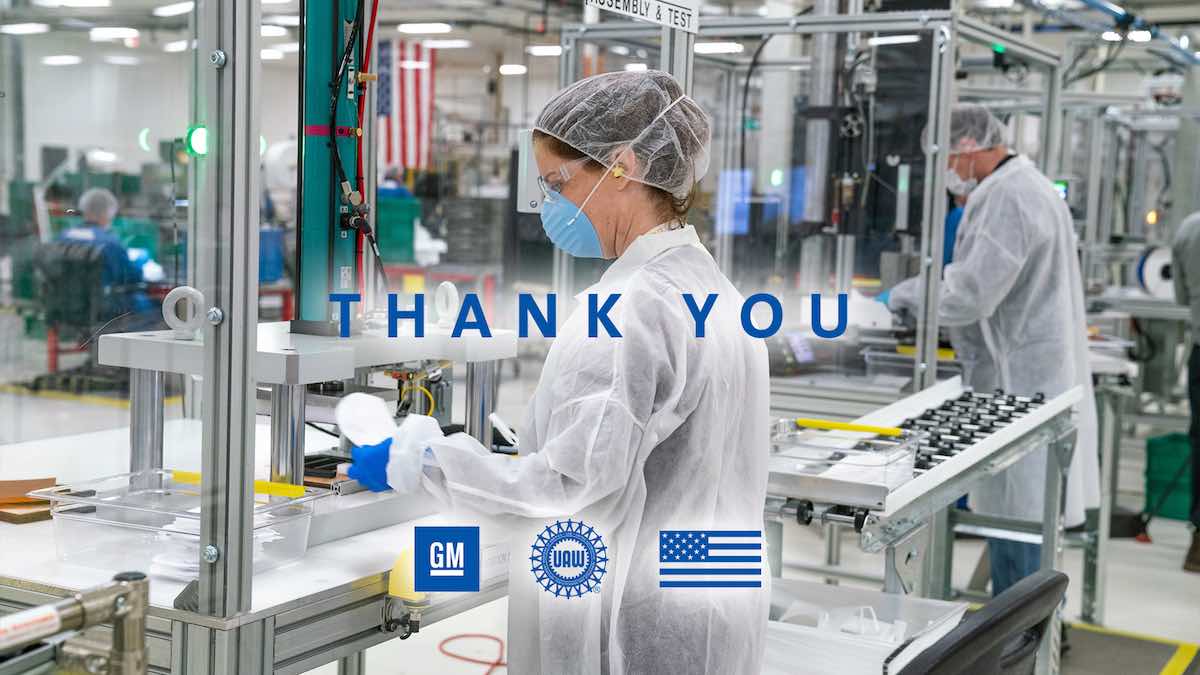| | | | | | | Presented By General Motors | | | | Generate | | By Ben Geman ·Dec 02, 2020 | | Good morning! Today's Smart Brevity count: 1,110 words, 4 minutes. 🎸Sunday will mark the 1968 release date of the Rolling Stones' "Beggars Banquet" (their second-best album IMHO), which provides today's intro tune... | | | | | | 1 big thing: The chasm between CO2 goals and energy production |  Reproduced from the Production Gap Report; Chart: Axios Visuals Projected and planned levels of global oil, natural gas and coal production are waaaaay out of step with the kind of emissions cuts needed to hold global warming significantly in check, a new analysis shows. Why it matters: The "production gap" report from the UN's environment agency and other researchers provides another lens onto how the world is nowhere near on track to meet the Paris climate deal's goals. The latest: The report estimates the emissions from burning fuels produced under an assessment of countries' estimated and planned extraction levels. By the numbers: A pathway consistent with holding long-term warming to 1.5°C above preindustrial levels — the most ambitious and super-longshot Paris goal — would require fossil fuel production decreases of 6% annually over the next decade. - Production of coal, the most CO2-heavy fuel, would need to fall by 11% annually over the next decade under the long-term 1.5°C pathway. Oil and natural gas would need to see smaller declines.
- A pathway toward a 2°C target, which is still very hard, would need a 2% annual decline in fossil fuel production over the next decade.
Threat level: They found "countries are instead planning and projecting an average annual increase of 2%, which by 2030 would result in more than double the production consistent with the 1.5°C limit." The big picture: The report lays bare the scope of the challenge at a pretty pivotal moment... - China, Japan and other countries, as well as many giant energy producers, are making long-term decarbonization pledges — but lots of blanks need to be filled in, to say nothing of actually trying to implement the splashy goals.
- The next big UN climate conference in late 2021 is meant as a forum for countries worldwide to commit to stronger and more concrete steps.
- President-elect Joe Biden is vowing to make global climate diplomacy a priority, bringing on former Secretary of State John Kerry as his special envoy.
Between the lines: The authors say the pandemic-related production declines this year won't lead to the long-term changes needed to get on track toward those temperature targets. - They also warn that the shape of governments' economic recovery packages thus far favor fossil fuels over low-carbon energy.
- As of mid-November, G20 governments have committed over $230 billion to "activities that support fossil fuel production and consumption," though that's defined very broadly and includes things like aid to airports and airlines, highways, and automakers.
- In contrast, there's been roughly $150 billion for renewables, efficiency, low-carbon transit like rail and cycling, and other climate-friendly investments.
Of note: The report is from the UN, the Stockholm Environment Institute, the International Institute for Sustainable Development, the Overseas Development Institute and the climate think tank E3G. |     | | | | | | 2. Hyundai makes its move on EV tech |  | | | Hyundai's EV architecture. Photo courtesy of Hyundai | | | | Hyundai Motor Group says they've developed the in-house technology to thrive in the emerging market for electric vehicles as they prepare to unveil a suite of new models over the next several years. Driving the news: The company yesterday took the wraps off "E-GMP," the Korean automakers' first dedicated EV platform. Why it matters: Having an EV-specific platform is important for enabling scale and the ability to build multiple types of EVs using the same manufacturing architecture. - "E-GMP reduces complexity through modularization and standardization, allowing rapid and flexible development of products which can be used across most vehicle segments, such as sedans, SUVs and CUVs," they said.
By the numbers: Hyundai said models built on the platform will have range of over 310 miles and will be able to charge up to 80% within 18 minutes at high-speed charging stations. - "High performance models" based on E-GMP will go from zero to 60 miles per hour in around 3.5 seconds, with top speeds of over 160 miles per hour.
What's next: Hyundai plans to introduce 23 new EVs by 2025, with an overall target of selling 1 million by then. - The company had announced in August the creation of its Ioniq EV unit, with plans for the first vehicle under the effort, a crossover, to arrive next year.
- Yesterday, they said from 2021 the E-GMP will underpin a range of fully electric cars, including the Ioniq and Kia Motors' first dedicated EV.
Go deeper: Hyundai, Kia and Genesis' electric futures ride atop the E-GMP platform (CNET) |     | | | | | | Bonus car content: Biden and Tesla | | Election 2020: "A group representing major automakers on Tuesday vowed to work with President-elect Joe Biden on efforts to reduce vehicle emissions even as the industry remains split over whether to let California set its own emission rules." (Reuters) Hypotheticals: "Elon Musk would consider leveraging Tesla's mega $554 billion market cap to buy a legacy automaker, but only if it was on friendly terms, the billionaire entrepreneur said Tuesday in a wide-ranging interview with Axel Springer CEO Mathias Döpfner." (TechCrunch) |     | | | | | | A message from General Motors | | These videos are preparing kids to be future engineers | | |  | | | | Using everyday items, kids can recreate STEM projects in the comfort of their homes. Here's how: Electrifying Engineering, a series of online videos from GM, is helping students learn about electric car motors, autonomous vehicle sensors, electric car charging and more. Get started. | | | | | | 3. Corporate boards with women do better on climate |  | | | Illustration: Aïda Amer/Axios | | | | Having at least 30% women on corporate boards "makes a key difference to climate governance and innovation," per new analysis of thousands of companies from the research firm BloombergNEF. Why it matters: Companies worldwide are coming under increased pressure to curb emissions, adopt cleaner tech and disclose emissions data. The big picture: The analysis of nearly 12,000 companies shows the strongest correlation (yes, I know, it's not the same as causation!) between gender diversity and governance, notably disclosures. - There's a "somewhat positive" link on performance, such as investments in renewable power and efficiency.
- However, "higher emitting sectors such as oil and gas companies, show limited correlation between emission reduction and board diversity."
- On the innovation front, firms with gender-diverse boards produce more and better patents.
By the numbers: A snapshot of 2,800 companies' emissions growth between 2016–2018 shows that companies with over 30% female boards averaged 0.6% emissions growth, compared to 3.5% for companies with no women in the boardroom. How it works: Top-level findings on the oil sector in the broader report, which was conducted in collaboration with the Sasakawa Peace Foundation, include... - "Leading integrated oil companies that have decarbonization strategies and are invested in digitalization activities also have higher female representation on the board."
- "Gender diversity, however, does not directly contribute to lowering emissions and expanding digitalization."
Yes, but: The number of companies of all sorts worldwide that have gender-diverse boards is growing, although women are still very underrepresented. - "The number of companies with more than 30% women on the board of directors has increased eightfold in just over a decade, from 2% in 2009 to 16% today," the report finds.
|     | | | | | | 4. Catch up fast: Banking, Congress, VC | | U.S. exit: "Bank of Montreal is winding down its U.S. oil and gas investment banking business and will focus on assets in Canada going forward, becoming the latest financial institution to cut ties with America's beleaguered shale industry." (Bloomberg) Election 2020: "A broad cross section of big U.S. corporations including Amazon.com Inc., Citigroup Inc. and Ford Motor Co. are calling on Congress to work closely with President-elect Joe Biden to address the threat of climate change." (WSJ) IoT funding: "GreenCom Networks, the Internet-of-things platform provider that's become a go-to for major European utilities to control solar panels, batteries, electric vehicle chargers and smart home energy loads, has landed another funding round with two new strategic investors that could open new markets." (Greentech Media) |     | | | | | | A message from General Motors | | You answered the call | | |  | | | | When America needed ventilators, masks, and face shields, GM and UAW workers answered the call. You delivered 30K critical care ventilators in just 4 months. You used your skills to help save lives. So from GM, from the UAW, and from your nation: thank you. | | | | | | Axios thanks our partners for supporting our newsletters.
Sponsorship has no influence on editorial content. Axios, 3100 Clarendon Blvd, Suite 1300, Arlington VA 22201 | | | You received this email because you signed up for newsletters from Axios.
Change your preferences or unsubscribe here. | | | Was this email forwarded to you?
Sign up now to get Axios in your inbox. | | | | Follow Axios on social media:    | | | | | |






No comments:
Post a Comment